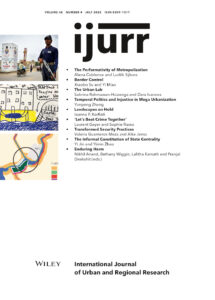This article examines the hitherto overlooked temporal politics and resultant injustice in theorizing urban transformations in China. Through a micro-level, in-depth case study of the lifespan of Guangling New City, it unravels the complex and at times conflicting ways in which different temporal dimensions of this mega project were manipulated, exploited and experienced. In particular, it unravels the organization of, and the divisions within, the dominant elites and illustrates how their conflicting and changing interests in time shaped the trajectory of the new city project. Residents caught up in the urbanization process were not completely opposed to the dominant temporalities of the project. Some of them partially submitted to its promises and visions; others gained a marginal degree of control over the temporalities. Both outcomes contradictorily reproduced their submission to dominant interests and power in the urban development game. Time thus played a critical role in enabling and sustaining land-based accumulation, despite the injustice involved. On this basis, this article calls for a more grounded approach to bring out the messy and contradictory temporal politics of urban development in order to improve the planning and delivery of megaprojects.

